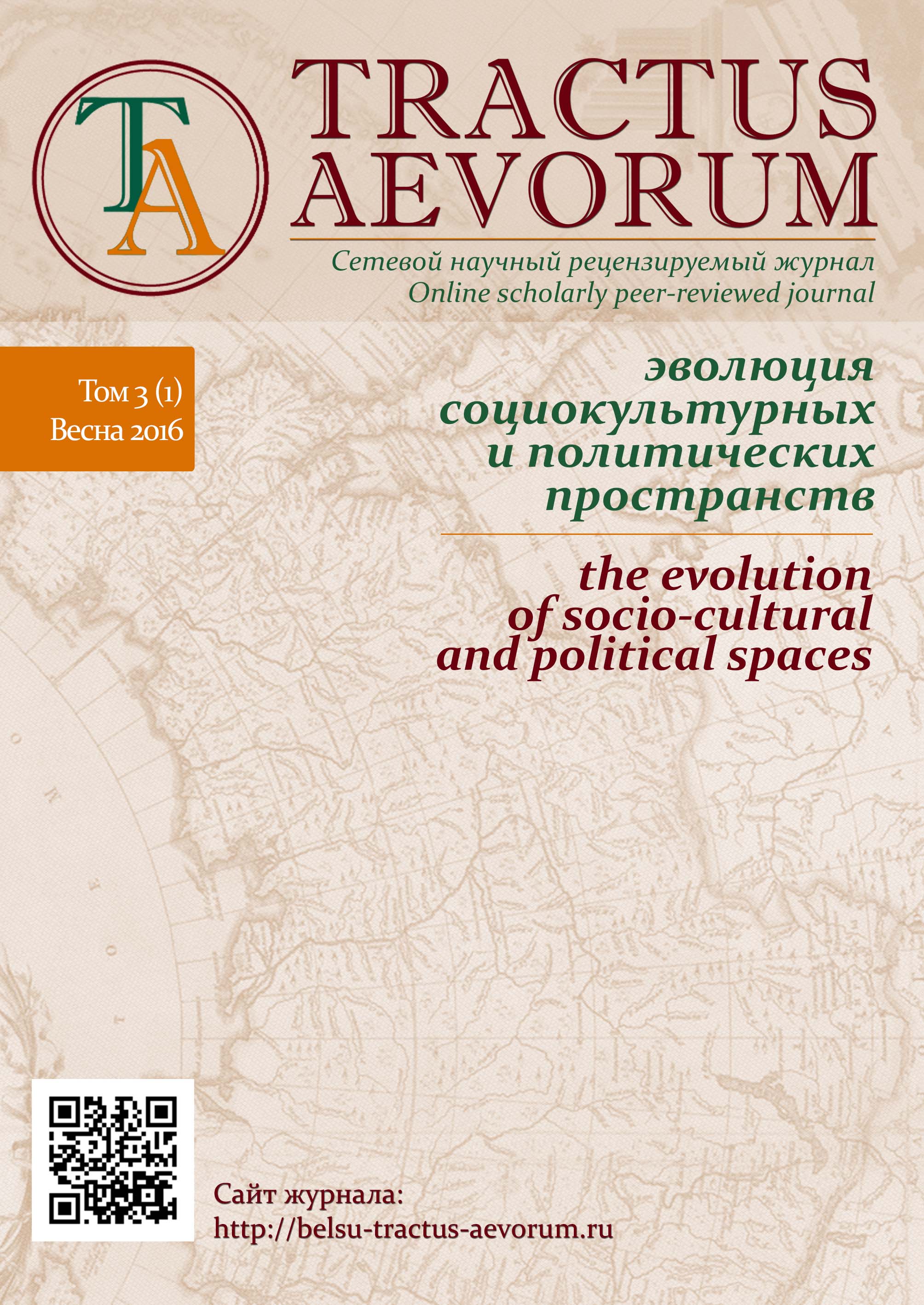
TRACTUS AEVORUM 3(1). Spring 2016
|
Contents
EMPIRES & PERIPHERIES
THE KERCH STRAIT CROSSING AS A SITE
OF NOMADIC TRANSIT FROM EUROPE INTO ASIA
A. L. Ermolin
The Zinman Institute of Archaeology, University of Haifa
This article is devoted to communications in the ancient world. The author highlights the Kerch Strait (the Cimmerian Bosporus) crossing as a key site of nomadic transit from Europe into Asia. Based on paleographic, archeological and written sources, he charts the details of the crossing location, while demonstrating the close correlation between regional defense and the direction and nature of transit across the Strait. The strategic control over the crossing is considered to have been the main task of the Bosporan Kingdom in the ancient period.
|
|
HELLENISM IN THE SYSTEM OF BYZANTINE IDENTITY
I. Iu. Vashcheva
Lobachevsky State University of Nizhni Novgorod
This article explores the complex and much debated problem of Byzantine identity through an examination of the relationship between its three main components: Romanitas, Hellenism and Christianity. It focuses primarily on the substantive aspects of Byzantine Hellenism. The analysis is based on material from the Church Histories of late antiquity.
Overall, the church historical works of the fourth to sixth centuries A.D. demonstrate an ambivalent attitude by Christian authors to the Hellenic legacy. Although Christian truth is clearly prioritized, appeals to the Hellenic legacy and allusions to classical education, literature, and events in the ancient (pagan) past are not perceived as something wholly negative. In this framework, the concepts of Hellenic, Roman and Christian did not contradict one another, but rather became well integrated. One particularly important role of Hellenism in Byzantine identity is perhaps connected with the transfer of main identification characteristics to a more cultural than religious sphere. In the early Byzantine period, the core of Hellenism was not geographical, ethno-political, linguistic, or even religious. Instead, it represented a system of paideia that proved generally consistent with the Christian faith, while also consonant with the Christian idea of education for the sake of the salvation of mankind.
|
|
HISTORIOGRAPHY
RUSSIAN HISTORIOGRAPHY ON THE SERF PEASANTRY
DURING THE FINAL STAGE OF SERFDOM IN RUSSIA
L. M. Rianskii, R. L. Rianskii
Kursk State University
The authors assess the contemporary Russian historiography on serfs’ economic conditions before the abolition of serfdom in the Russian Empire. They concentrate on studies published in the Soviet Union and Russia from the mid-twentieth through the early twenty-first centuries. The authors conclude that, after a ten year lull in scholarship, there has been a recent revival of interest in the serf village during the first half of the nineteenth century, although it has not reached the scale characteristic of Soviet historiography in the 1950s through 1970s.
|
|
INTERNATIONAL TRANSFORMATIONS
THE EVOLUTION OF LOCAL HUMAN CIVILIZATIONS AND
THE PROBLEM OF THE PROLIFERATION OF STANDARDS
IN INTERNATIONAL RELATIONS
L. Iu. Gusev, A. A. Kazantsev
MGIMO University
The authors consider the ongoing development of local human civilizations in the neighboring regions to Russia (Europe, the Islamic world, and the Pacific Rim). This issue is analyzed through the proliferation of norms within the system of international relations, a key process in guaranteeing international stability. The authors conclude that the speed of norm proliferation in international relations in the twenty-first century will be hampered by a number of factors. First, the dynamics of European and American development indicate a clear decrease in unifying potential as a result of Western influence on other civilizations. Second, the study of the development of Islamic civilization indicates a significant potential for rejection of norm unification. Third, analysis of Pacific Rim civilizations demonstrates that economic development of this region is accompanied by a set of alternative cultural norms to the Eurocentric world.
|
|
EX LIBRIS
CONTROL OVER FOREIGNERS IN
THE RUSSIAN EMPIRE (1801-61)
A. N. Biktasheva
National Research University “Higher School of Economics”
The author reviews “To Oversee Properly:” Control over Foreigners in the Russian Empire (1801-61) (Smolensk, 2013) by A. V. Tikhonova.
|
|
Full issue in PDF
|

